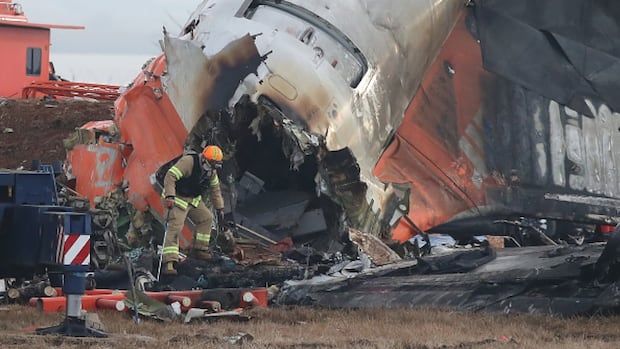South Korean police said Thursday they had raided Jeju Air and the operator of Muan International Airport as part of their investigation into Sunday’s crash that killed 179 people in the country’s worst aviation disaster on soil.
Jeju Air 7C2216, which had departed from Thailand’s capital Bangkok to Muan in southwest Korea, landed belly-up and overran the regional airport’s runway, bursting into flames after hitting an embankment.
Two crew members, who were seated at the bottom of the Boeing 737-800, were pulled alive by rescuers but were injured.
Police investigators are searching the offices of the airport operator and the transport ministry’s aviation authority in the southwestern city of Muan, as well as Jeju Air’s office in Seoul, South Jeolla provincial police said in a media statement.
Investigators plan to seize documents and materials related to the operation and maintenance of the plane, as well as the operation of airport facilities, a police official told Reuters.
A spokesperson for Jeju Air said the airline is checking the situation. The airport’s operating company was not immediately available for comment.
South Korea’s acting president, Choi Sang-mok, ordered emergency safety inspections of all Boeing 737-800 planes operated by the country’s airlines after the Jeju Air crash killed almost all passengers on board.
Questions from air safety experts about what led to the deadly explosion have focused on the embankment designed to support navigation equipment that they said is too rigid and too close to the end of the runway.
“This rigid structure proved disastrous when the glider made impact,” said Najmedin Meshkati, an engineering professor at the University of Southern California, adding that it was troubling that the navigation antenna was mounted on “such a formidable concrete structure, instead of standard. Metal tower/pylon installation.”
Landing gear not deployed
An investigation into the Jeju Air flight is also underway involving South Korean officials and the US National Transportation Safety Board (NTSB), the Federal Aviation Administration (FAA) and the plane’s manufacturer, Boeing.
It remains unanswered why the plane did not deploy its landing gear and what prompted the pilot to apparently rush into a second attempt to land after telling air traffic control the plane had suffered a bird strike and declared an emergency .
The plane’s flight data recorder, which suffered some damage, is being sent to the United States for analysis in cooperation with the NTSB.

The conversion of data from the cockpit voice recorder to an audio file should be completed by Friday, said Acting President Choi Sang-mok, who could provide critical information about the doomed flight’s final minutes.
A transport ministry official said on Wednesday that it may be difficult to release the audio files as they will be critical to the ongoing investigation.
Choi told a disaster management meeting that immediate action should be taken if a special inspection of all Boeing 737-800 aircraft operating in the country reveals any problems. Choi’s comments at the start of the meeting were released by his office.
Investigators from the NTSB, FAA and Boeing are in South Korea to assist the investigation.
Choi urged that no effort be spared to help the families of the victims after the remains of those killed are handed over to them. He also asked the police to take action against anyone posting “kind” messages and fake news on social media about the disaster.


